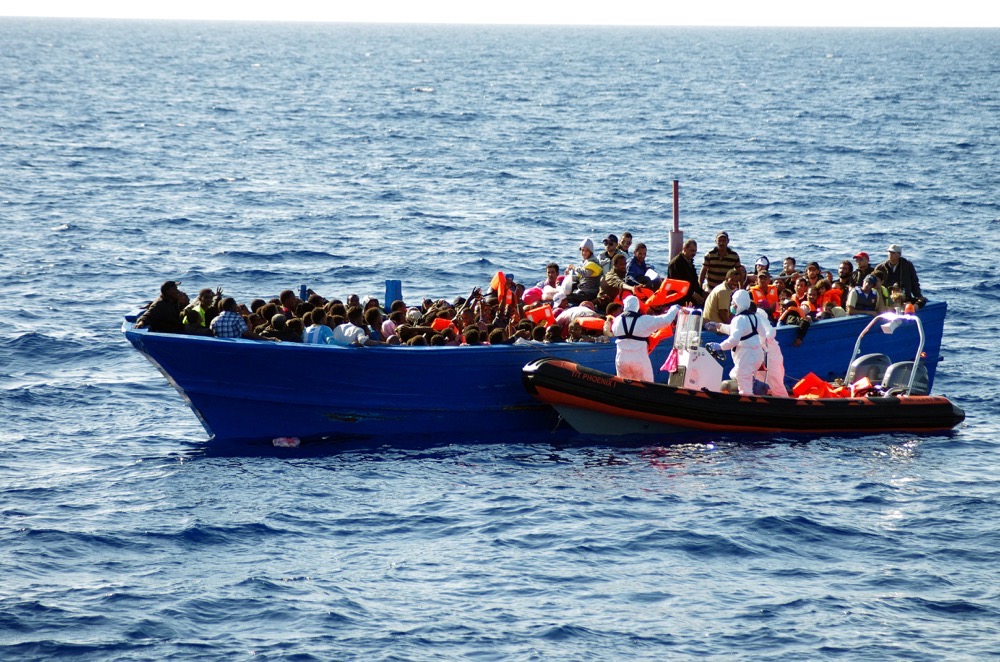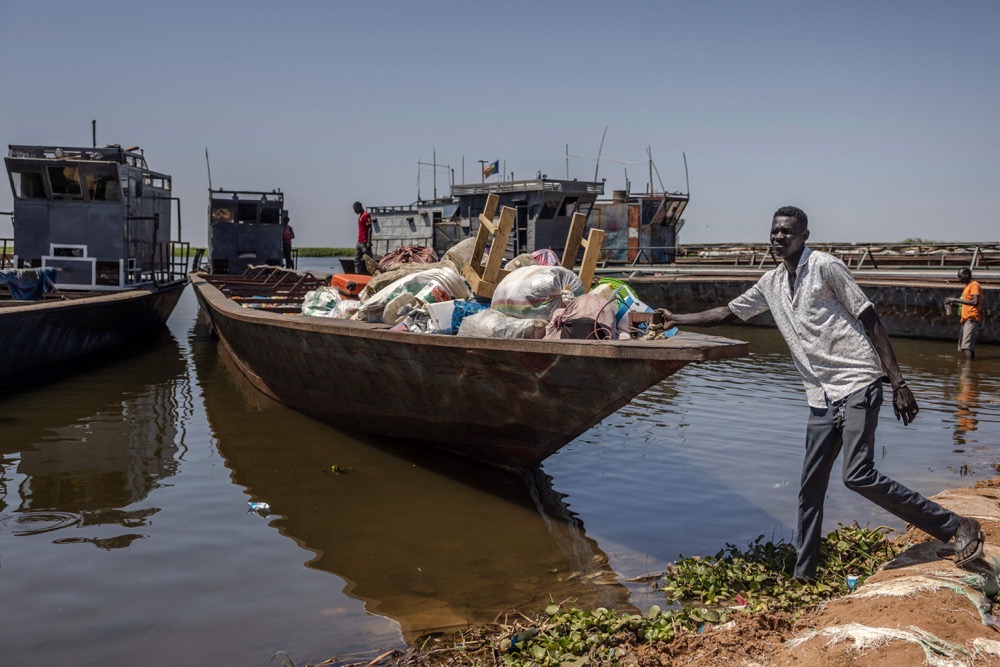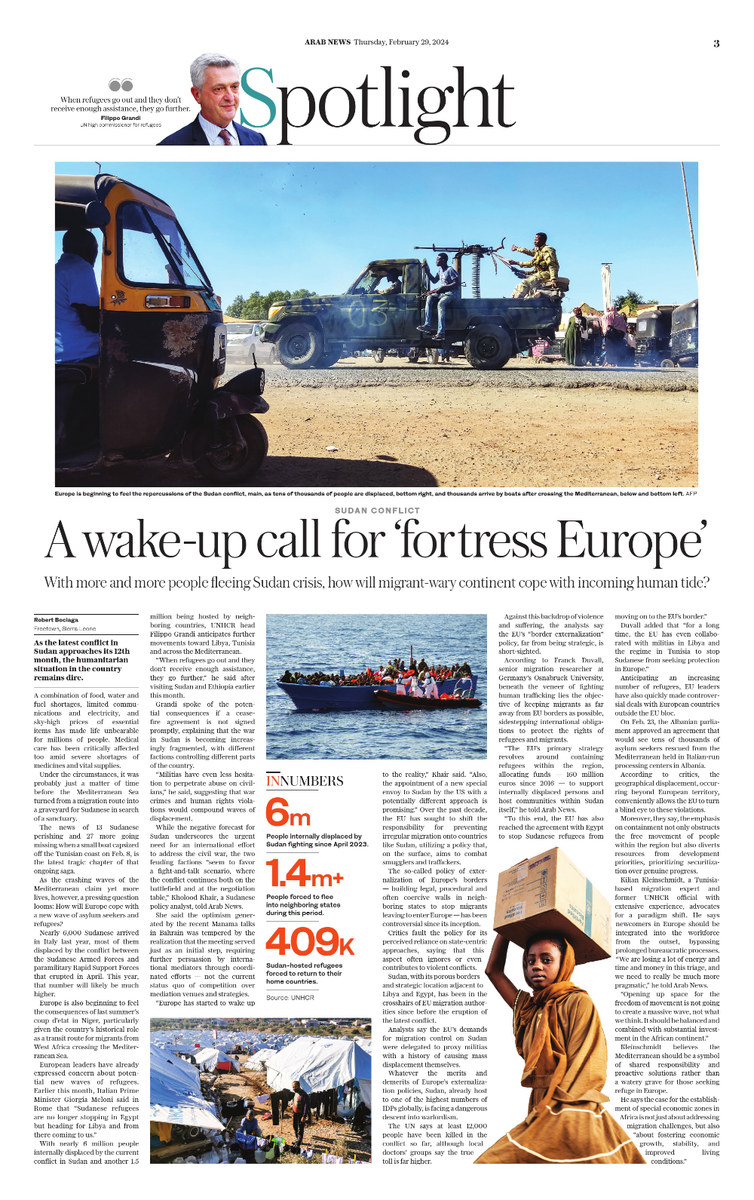FREETOWN, Sierra Leone: As the latest conflict in Sudan approaches its 12th month, the humanitarian situation in the country remains dire.
A combination of food, water and fuel shortages, limited communications and electricity, and sky-high prices for essential items has made life unbearable for millions of people. Medical care has been critically affected too amid severe shortages of medicines and vital supplies.
Under the circumstances, it was probably just a matter of time before the Mediterranean Sea turned from a migration route into a graveyard for Sudanese in search of a sanctuary.
The news of 13 Sudanese perishing and 27 more going missing when a small boat capsized off the Tunisian coast on Feb. 8, is the latest tragic chapter of that ongoing saga.
As the crashing waves of the Mediterranean claim yet more lives, however, a pressing question looms: How will Europe cope with a new wave of asylum seekers and refugees?
Nearly 6,000 Sudanese arrived in Italy last year, most of them displaced by the conflict between the Sudanese Armed Forces and paramilitary Rapid Support Forces that erupted in April. This year, that number will likely be much higher.

Sudanese girls who have fled from the war in Sudan gather under a shade at a Transit Centre for refugees in Renk. (AFP/File)
Europe is also beginning to feel the consequences of last summer’s coup d’etat in Niger, particularly given the country’s historical role as a transit route for migrants from West Africa crossing the Mediterranean Sea.
European leaders have already expressed concern about potential new waves of refugees. Earlier this month, Italy’s Prime Minister Giorgia Meloni said in Rome that “Sudanese refugees are no longer stopping in Egypt but heading for Libya and from there coming to us.”
With nearly 6 million people internally displaced by the current conflict in Sudan and another 1.5 million being hosted by neighboring countries, UNHCR head Filippo Grandi anticipates further movements toward Libya, Tunisia and across the Mediterranean.
“When refugees go out and they don’t receive enough assistance, they go further,” he said after visiting Sudan and Ethiopia earlier this month.
Grandi spoke of the potential consequences if a ceasefire agreement is not signed promptly, explaining that the war in Sudan is becoming increasingly fragmented, with different factions controlling different parts of the country.
“Militias have even less hesitation to perpetrate abuse on civilians,” he said, suggesting that continued war crimes and human-rights violations could trigger further displacement.
As grim and foreboding as Sudan’s immediate future may be, the two feuding factions “seem to favor a fight-and-talk scenario, where the conflict continues both on the battlefield and at the negotiation table,” Kholood Khair, a Sudanese policy analyst, told Arab News.

Armed Sudanese civilians wave weapons and chant slogans as they drive through the streets of Gedaref city in eastern Sudan. (AFP/File)
She said the optimism generated by the recent Manama talks in Bahrain was tempered by the realization that the meeting served just as an initial step, requiring further persuasion by international mediators through coordinated efforts — not the current status quo of competition over mediation venues and strategies.
“Europe has started to wake up to the reality,” Khair said. “Also, the appointment of a new special envoy to Sudan by the US with a potentially different approach is promising.”
Over the past decade, the EU has sought to shift the responsibility for preventing irregular migration onto countries like Sudan, utilizing a policy that, on the surface, aims to combat smugglers and traffickers.
Opinion
This section contains relevant reference points, placed in (Opinion field)
The so-called policy of externalization of Europe’s borders — building legal, procedural and often coercive walls in neighboring states to stop migrants leaving to enter Europe — has been controversial since its inception.
Critics fault the policy for its perceived reliance on state-centric approaches, saying that this aspect often ignores or even contributes to violent conflicts.
Sudan, with its porous borders and strategic location adjacent to Libya and Egypt, has been in the sights of EU migration authorities since before the eruption of the latest conflict.

Nearly 6,000 Sudanese arrived in Italy last year. (AFP)
Analysts say the duty of meeting the EU’s demands for migration control on Sudan was delegated to proxy militias with a history of causing mass displacement themselves.
Whatever the merits and demerits of Europe’s border-externalization policies, the stark reality is that Sudan, already host to one of the highest numbers of internally displaced people globally, is facing a dangerous descent into warlordism.
The UN says at least 12,000 people have been killed in the conflict so far, although local doctors’ groups say the true toll is far higher.
Against this backdrop of violence and suffering, analysts say the EU’s border externalization policy is, far from being strategic, actually short-sighted.
According to Franck Duvall, senior migration researcher at Germany’s Osnabruck University, beneath the veneer of fighting human trafficking lies the objective of keeping migrants as far away from EU borders as possible, sidestepping international obligations to protect the rights of refugees and migrants.
INNUMBERS
• 6m People internally displaced by Sudan fighting since April 2023.
• 1.4m+ People forced to flee into neighboring states during this period.
• 409,000 Sudan-hosted refugees forced to return to their home countries.
Source: UNHCR
“The EU’s primary strategy revolves around containing refugees within the region, allocating funds — 160 million euros since 2016 — to support internally displaced persons and host communities within Sudan itself,” he told Arab News.
“To this end, the EU has also reached the agreement with Egypt to stop Sudanese refugees from moving on to the EU’s border.”
Duvall added that “for a long time, the EU has even collaborated with militias in Libya and the regime in Tunisia to stop Sudanese from seeking protection in Europe.”
Anticipating an increasing number of refugees, EU leaders have also quickly made controversial deals with European countries outside the EU bloc.

Sudanese refugees who have fled from the war in Sudan get off a truck in Renk. (AFP/File)
On Feb. 23, the Albanian parliament approved an agreement that would see tens of thousands of asylum seekers rescued from the Mediterranean held in Italian-run processing centers in Albania.
According to critics, the geographical displacement, occurring beyond European territory, conveniently allows the EU to turn a blind eye to these violations.
Moreover, they say, the emphasis on containment not only obstructs the free movement of people within the region but also diverts resources from development priorities, prioritizing securitization over genuine progress.
Kilian Kleinschmidt, a Tunisia-based migration expert and former UNHCR official with extensive experience, advocates for a paradigm shift. He says newcomers in Europe should be integrated into the workforce from the outset, bypassing prolonged bureaucratic processes.
“We are losing a lot of energy and time and money in this triage, and we need to really be much more pragmatic,” he told Arab News.
“Opening up space for the freedom of movement is not going to create a massive wave, not what we think. It should be balanced and combined with substantial investment in the African continent.”
Kleinschmidt believes the Mediterranean should be a symbol of shared responsibility and proactive solutions rather than a watery grave for those seeking refuge in Europe.

A South Sudanese returnee stands next to a boat loaded with belongings from families who have fled the war in Sudan. (AFP/File)
He says the case for the establishment of special economic zones in Africa is not just about addressing migration challenges, but also “about fostering economic growth, stability, and improved living conditions.”
As Europe grapples with a demographic decline and the continued need for a labor force, many officials and humanitarian actors say that embracing pragmatic approaches such as integrating newcomers into the workforce from the beginning will not only benefit migrants, but also contribute to the vitality of European economies.
The Sudan conflict, in a sense, underscores the urgent need for a comprehensive, humane, and forward-thinking approach that transcends borders and prioritizes the well-being and aspirations of individuals seeking a better life.
































